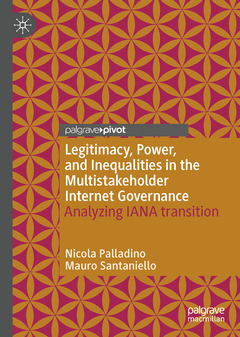Legitimacy, Power, and Inequalities in the Multistakeholder Internet Governance, 1st ed. 2021 Analyzing IANA Transition Information Technology and Global Governance Series
Auteurs : Palladino Nicola, Santaniello Mauro

This book aims to develop a critical understanding of multistakeholder governance in Internet Governance through an in-depth analysis of the Internet Assigned Numbers Authority (IANA) transition, the process through which the U.S. Government transferred its traditional oversight role over the Domain Name System to the global Internet community. In the last few decades, multistakeholderism has become the dominant discourse in the Internet Governance field, mainly because of its promise to provide democratic legitimacy for transnational policymaking, although empirical research has highlighted disappointing performances of multistakeholder arrangements. This book contributes to the debate on multistakeholder governance by analyzing the IANA Transition process's normative legitimacy, broken down in the dimensions of input legitimacy (inclusiveness, balanced representation, and representativeness), throughput legitimacy (procedural and discursive quality), and output legitimacy (outcome and institutional effectiveness). Findings warn about the risk that multistakeholderism could result in a misleading rhetoric legitimizing existing power asymmetries.
Chapter 1. Introduction - The IANA Transition and Internet Multistakeholder Governance.- Chapter 2. Foundations, pitfalls, and assessment of multistakeholder governance.- Chapter 3. IANA functions, ICANN and the DNS war.- Chapter 4. The Institutional Design of the IANA Transition process.- Chapter 5. The Input Legitimacy of the IANA Transition Process.- Chapter 6. The Throughput Legitimacy of the IANA Transition process.- Chapter 7. The Output Legitimacy of the IANA Transition process.- Chapter 8. Conclusion: The misleading rhetoric of multistakeholderism.
Nicola Palladino is a research fellow at the Department of Political and Social Studies, University of Salerno, Italy, where he works at the Internet & Communication Policy Center. He has taken part in several national and international research projects on Internet Governance, Internet Policy and Digital Constitutionalism processes.
Mauro Santaniello is a researcher at the Department of Political and Social Studies, University of Salerno, Italy, where he teaches Internet Governance and Digital Policy. He is a co-founder and vice director of the Internet & Communication Policy Center. He has led several research groups on Internet Governance and Policy.
Date de parution : 11-2020
Ouvrage de 156 p.
14.8x21 cm



